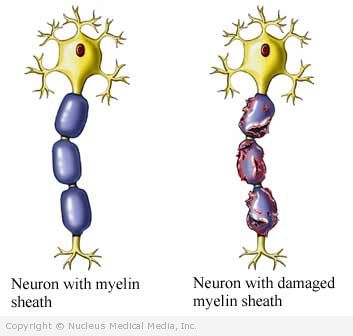Multiple Sclerosis – Definition
Multiple sclerosis (MS) is a disease of the central nervous system. It is a chronic condition that can be disabling.
There are several types of MS:
- Relapsing-remitting MS — Symptoms suddenly reappear periodically. They last for a few weeks or months, then go back into remission (a period with no symptoms). Symptoms may get worse with each occurrence.
- Primary progressive MS — Symptoms gradually worsen after symptoms first appear. Relapses and remissions usually do not occur.
- Secondary progressive MS — After years of relapses and remissions, symptoms suddenly begin to progressively worsen.
- Progressive relapsing MS — Symptoms gradually worsen after symptoms first appear. One or more relapses may also occur.
Multiple Sclerosis – Causes
The immune system normally attacks viruses or bacteria that should not be in the body. With MS, a problem with the immune system causes it to attack healthy nerves. In particular, MS attacks the nerve fibers in the brain, spinal cord, and the nerves of the eye. The exact cause of these immune problems is unknown.
The following may contribute to the development of MS:
- Viral or other infection
- Genetic factors (heredity)
- Environmental factors
- Breaking down of parts of the nervous system
Multiple Sclerosis – Risk Factors
Factors that increase your chance of MS include:
- Sex: female
- Age: 15-50 years old
- Being exposed to certain viruses
- Having family members who have MS or other autoimmune disorders
- Being of Northern European descent
- Growing up in a colder climate, as opposed to a tropical climate
- Having certain immune system genes
- Having inflammation of the optic nerve
Other factors that may play a role include:
- Having low vitamin D levels
- Smoking
- Having shingles
Multiple Sclerosis – Symptoms
Symptoms may range from mild to severe and may include:
- Numbness or tingling in the face or limbs
- Impaired vision in one or both eyes, including:
- Blurred vision
- Double vision
- Loss of vision
- Eye pain
- Fatigue
- Dizziness
- Muscle stiffness
- Muscle spasms
- Muscle weakness
- Incoordination or falling
- Trouble walking or maintaining balance
- Weakness in one or more limbs
- Bladder problems including:
- Urgency
- Hesitancy
- Incomplete emptying
- Incontinence
- Bowel problems, including constipation
- Sexual dysfunction
- Slurred speech
- Difficulty swallowing
- Forgetfulness, memory loss, and confusion
- Difficulty concentrating or solving problems
- Depression
Symptoms may worsen with:
- Heat, including:
- Hot weather
- Hot baths or showers
- Fever
- Overexertion — intense physical activity
- Infection
Multiple Sclerosis – Diagnosis
The doctor will ask about your symptoms and medical history. A physical exam will be done.
Tests may include:
- MRI scan — a test that uses magnetic waves to make pictures of structures inside the brain and spinal cord
- Sensory evoked potentials — a test that records the electrical responses evoked after a sensory stimulus
- Lumbar puncture (spinal tap) — removal of a small amount of fluid (CSF) from around the spinal cord to check for white blood cells, antibodies, and proteins
- Blood tests to rule out other diseases that may mimic MS (eg, B12 deficiency, Lyme disease, autoimmune disease)
- Visual evoked potential test —to look for problems in the brain that affect vision
Multiple Sclerosis – Treatment
The goals of MS treatment are to relieve symptoms, prevent relapses, delay disability, and slow disease progression.
Treatments include:
Medications
Medicines may include:
- Interferon beta (such as Betaseron, Avonex, Rebif) — (a protein that naturally occurs in the body) — used to suppress the immune system
- Glatiramer acetate (Copaxone) — to help prevent MS relapses by modifying the function of the immune system
- Other immunosuppressive drugs, such as:
- Intravenous immunoglobulin
- Cyclophosphamide (Cytoxan)
- Mitoxantrone (Novantrone)
- Azathioprine (Imuran, Azasan)
- Methotrexate (Rheumatrex, Trexall)
- Intravenous immunoglobulin (IVIG)
- Natalizumab (Tysabri) — for relapsing-remitting MS (This medicine is under a mandatory registration program.)
- Muscle relaxants—to treat muscle spasms or stiffness
- Fingolimod (Gilenya) — a new oral medicine to reduce relapses and slow the progression of MS
Other medications may also be given to treat symptoms:
- Corticosteroids — to reduce nerve tissue inflammation and shorten MS flare-ups
- Dalfampridine (Ampyra) — a medicine to improve walking in patients with MS
- Botox injections may be used to treat spasticity in the arms and legs.
- Other drugs to treat:
- Fatigue
- Depression
- Pain
- Bladder or bowel problems
Physical Therapies and Lifestyle Changes
Therapies and changes may include:
- Regular moderate exercise with your doctor’s permission — Swimming may be especially beneficial.
- Physical therapy to help maintain muscle strength and tone, dexterity, and walking ability
- Massage
- High fiber diet to prevent constipation
- Stress reduction techniques
- Quitting smoking — Smoking may worsen MS, causing the condition to progress to a more severe form.
Psychological Therapies
Individual or group therapy will help you learn coping strategies for physical symptoms and emotional stress.
If you are diagnosed with MS, follow your doctor’s instructions.
Multiple Sclerosis – Prevention
There are no guidelines for preventing MS because the cause is unknown.
To prevent flare-ups or worsening symptoms if you have MS:
- Take medications as prescribed.
- Avoid hot weather.
- Stay in air-conditioned places during periods of hot weather.
- Get adequate rest.
- Get regular, moderate exercise with your doctor’s permission.
- Avoid hot showers or baths.
- Make sure to get enough fiber in your diet.
- To aid in stress reduction, consider getting regular massages.
- Try to avoid infection. You can do this by:
- Practicing good hygiene
- Staying away from people who are sick
- Cooking food thoroughly
- Practicing safe sex

